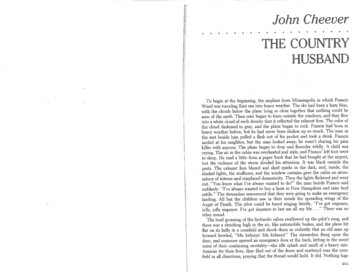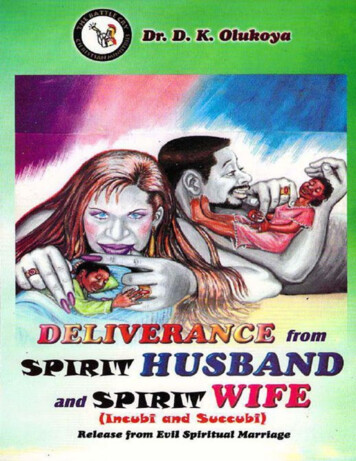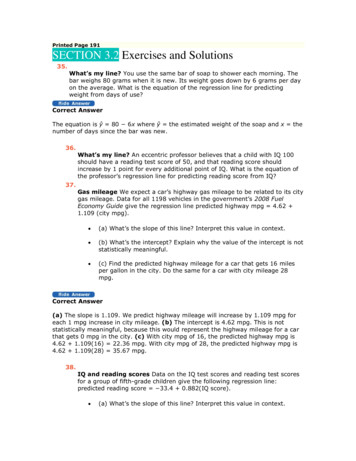
Transcription
To begin at the beginnin, g, the airplane from Minneapolis in which FrancisWeed was traveling East ran into heavy weather. The sky had been a hazy blue,with the clouds below the plane lying so dose together that nothing could beseen of fhe earth. Then mist began to form outside the windows, and they flewinto a white cloud of such density that it reflected the exhaust fires. The color ofthe cloud darkened to gray, and the plane began to rock. Francis had been inheavy weather before, but he had never been shaken up so much. The man inthe seat beside him pulled a flask out of his pocket and took a drink. Francissmiled at his neighbor, but the man looked away; he wasn’t sharing his painkiller with anyone. The plane began to drop and flounder wildly. A child wascrying. The air in the cabin was overheated and stale, and Francis’ left foot wentto sleep. He read a little from a paper book that he had bough.t at the airport,but the violenee of the storm divided his attention. It was black outside theports. The exhaust fires blazed and shed sparks in the dark, and, inside, theshaded lights,, the stuffiness, .and the window curtains gave the cabin an atmosphere of intense and misplaced domesticity. Then the lights flickered and wentout. "You know what I’ve always wanted to do?" the man beside Francis saidsuddenly. ’Tve always wanted to buy a farm in New Hampshire and raise beefcattle." The stewardess announced that they were going to make an emergencylanding. All but the children saw in their minds the spreading wings of theAngel of Death. The pilot could be heard singing faintly,. "I’ve got sixpence,jolly, jolly sixpence. I’ve got sixpence to last me all my life ." There was noother sound.The loud groaning of the hydraulic valves swallowed up the pilot’s song, andthere was a shrieking high in the air, like automobile brakes, and the plane hitflat on its belly in a cornfield and shook them so violently, that an old man upforwar t howled, "Me kidneys! Me :laneys. The stewardess flung open thedoor, and someone opened an emergency door at the back, letting in the sweetnoise of their continuing mortality--the idle splash and smell of a heavy rain.Anxious for their lives, they filed out of the doors and s attered over the cornfield in all directions, praying that the thread would, hold. It did. Nothing hap-
aoaJOr Npened. When it was clear that the plane would not burn or explode, the crewand the stewardess gathered the passengers together and led them to the shelterof a barn. They were not far from Philadelphia, and in a little while a string oftaxis took them into the city. "It’s iust like the Marne," someone said, but therewas surprisingly little relaxation of that suspiciousness with which many Americans regard their fellow travelers.In Philadelphia, Francis Weed got a train to New York. At the end of thatiourney, he crossed the city and caught iust as it was about to pull out the commuting train that he took five nights a week to his home in Shady Hill.He sat with Trace Bearden, "You know, I was in.that plane that iust crashedoutside Philadelphia," he said. "We came down in a field." He had traveledfaster than the newspapers or the rain, and the weather in New.York was sunnyand mild. It was a day in late September, as fragrant and shapely as an apple.Trace listened to the story, but how could he get excited? Francis had no powers .that would let him re-create a brush with death--particularly in the atmosphereof a commuting train, iourneying.through a sunny countryside where already, inthe slum gardens, there were signs of harvest. Trace picked up his newspaper,and Francis was left alone with his thoughts. He said good night to Trace on theplatform at Shady Hill and drove in his secondhand Volkswagen up to theBlenhollow neighborhood, where he lived.The Weeds’ Dutch Colonial house was larger than it appeared to be from thedriveway. The living room was spacious and divided like Gaul into three parts.Around an ell to the left as one entered from the vestibule was the long table,laid for six, with candles and a bowl of fruit in the center. The sounds and smellsthat came from the open kitchen door were appetizing,-for Julia Weed was agood cook. The largest part of the living room-centered on a fireplace. On theright were some bookshelves and a piano. The-room was polished and tranquil,and from the windows that opened to the west there Was some late-summersunlight, brilliant and as dear as water. Nothing here was neglected; nothinghad not been burnished. It was not the kind of household where, after pryingopen a stuck cigarette box, you would find an old shirt button and a tarnishednickel. The hearth was swept, the roses on the piano were reflected in the polishof the broad top, and there war an album of Schubert waltzes on the rack.Louisa Weed, a pretty girl of nine, was looking out the western windows. Heryounger brother Henry was standing beside her. Her still younger brother, Toby,was studying the figures of some tonsured monks drinking beer on the polishedbrass of thd woodbox. Francis, taking off his hat and putting down his paper,was not consciously pleased with the scene; he was not that reflective. It was hiselement, his creation, and he returned to it with that sense of lightness andstrength with which any creature returns to his home. "Hi, everybody," he said."The plane from Minneapolis ."Nine times out of ten, Francis would be greeted with affection, but tonightthe children are absorbed in their own antagonisms. Francis had not finished hissentence about the plane crash before Henry plants a kick in Louisa’s behind.Louisa swings around, saying, "Damn you!" Francis makes the mistake ofscolding Louisa for bad language before he punishes Henry. Now Louisa turnson her father and accuses him of favoritism. Henry is always right; she is perse-The Country Husband .cured and lonely; her lot is hopeless. Francis turns to his son, but the boy hasjustification for the kick--she hit him first; she hit him on the ear, which is dangerous. Louisa agrees with this passionately. She hit him on the ear, and shemeant to hit him on the ear, because he messed up her china collection. Henrysays that this is a lie. Little Toby turns away from the woodbox to throw in someevidence for Louisa. Henry claps his hand over little Toby’-s mouth’. Francis separates the two boys but accidentally pushes Toby into the Woodbox. Tobybegins to cry. Louisa is already crying. Just then, Julia Weed comes into thatpart of the room where the table is laid. She is a pretty, intelligent woman, andthe white in her hair is premature. She does not seem to notice the fracas."Hello, darling," she says serenely to Francis. "Wash your hands, everyone.Dinner is ready." She strikes a match and lights the six candles in this vale oftears.This simple announcement, like the war cries of the Scottish chieftains,-onlyrefreshes the ferocity of the combatants. Louisa gives Henry a blow on the shoulder. Henry, although he seldom cries, has pitched nine innings and is tired. Hebursts into tears. Little Toby discovers a splinter in his hand and begins to howl.Francis says loudly that he has been in a plane crash and that he is tired. Juliaappears again from the kitehefi and, still ignoring the chaos, asks Francis to goupstairs and tell Helen that everything is ready. Francis is happy to go; it is likegetting back to headquarters company. He is planning to tell his oldest daughterabout the airplane crash, but Helen is lying on her bed reading a True Romancemagazine, and the first thing .Francis does is to take.the magazine from her handand remind Helen that he has forbidden her to buy it. She did not buy it, Helenreplies. It was given to her by. her best friend, Bessie Black. Everybody readsTrue Romance. Bessie Black’s father reads True Romance. There isn’t a girl inHelen’s class who doesn’t read True Romance. Francis expresses his detestationof the magazine and then tells her that dinner is ready--although from thesounds downstairs it doesn’t seem so. Helen follows him down the stairs. Juliahas seated herself in the candlelight and spread a napkin over her lap. NeitherLouisa nor Henry has come to the table. Little Toby is still howling, lying facedown on the floor. Francis speaks to him gently: "Daddy was in a plane crashthis afternoon, Toby.Don’t you want to hear about it?" Toby goes on crying."If you don’t come to the table now, Toby," Francis says, ’Tll have to send youto bed without any supper." The little boy rises, gives him a cutting look, fliesup the stairs to his bedroom, and slams the door. "Oh dear," Julia says, andstarts to go after him. Francis says that she will spoil him. Julia says that Toby isten pounds underweight and has to be encouraged to eat. Winter is coming, andhe will spend the cold months in bed unless he has his dinner. Julia goes upstairs. Francis sits down at the table with Helen. Helen is suffering from the dismal feeling of having read too intently on a fine day, and she gives her father andthe room a jaded look. She doesn’t understand about the plane crash, becausethere wasn’t a drop of rain. in Shady Hill.Julia returns with Toby, and they all sit down and are served. "Do I have totook at that big, fat slob?" Henry says, of Louisa. Everybody but Toby entersinto this skirmish, and it rages up and down the table for five minutes. Towardthe end, Henry puts his napkin over his head and, trying to eat that way, spills
204 OHN CHEEVERThe Cour ry Husbandspinach all over his shirt. Francis asks Julia if the children couldn’t have theirdinner earlier. Julia’s guns are loaded for this. She can’t cook two dinners and laytwo tables. She paints with lightning strokes that panorama of drudgery inwhich her youth, her beauty, and her wit have been lost. Francis says that hemust be understood; he was nearly killed in an airplane crash, and he doesn’t liketo come home every night to a battlefield. Now Julia is deeply concerned. Hervoice trembles. He doesn’t come home every night to a battlefield. The accusation is stupid and mean. Everything was tranquil until he arrived. She stopsspeaking, puts down her knife and fork, and looks into her plate as if it is a gulf.She begins to cry. "Poor Mummy!" Toby says, and when Julia gets up from thetable, drying her tears with a napkin, Toby goes to her side. "Poor Mummy," hesays. "Poor Mummy[" And they climb the stairs together. The other childrendrift away from the b.attlefield, and Francis goes into the ha& garden for a cigarette and some air.It was a pleasant garden, with walks and flower beds and places to sit. Thesunset had nearly burned out, but there was still plenty of light. Put into athoughtful mood by the.crash and the battle, F ancis listened to the eveningsounds of Shady Hill. Varmint!! lxascals, old Mr. Nixon. shouted to thesquirrels in his bird-feeding station. "Avaunt and quit my sight!" A doorslammed. Someone was cutting grass. Then Donald Goslin, who lived at thecorner, began to play the "Moonlight Sonata." He did this nearly every night.He threw the tempo out the window and played it rubato from beginning toend, like an outpouring of tearful petulance,-lonesomeness, and self-pity--ofeverything it was Beethoven’s greatness not to know. The music rang up anddown the street beneath the trees like an appeal for love, for tenderness, aimed atsome lovely housemaid--some fresh-faced, homesick girl from Galway, looldngat old snapshots in her third-floor room. "Here, Jupiter, here, Jupiter," Franciscalled to the Mercers’ retriever. Jupiter crashed through the tomato vines withthe remains of a felt hat in his mouth.Jupiter was an anomaly, His .retrieving instincts and his high spirits were outof place, in Shady Hill. He was as black as coal, with a long, alert, intelligent,rakehell face. His eyes gleamed with mischief, and he held his head high. It wasthe fierce, heavily collared dog’s head that appears .in heraldry, in tapestry, andthat used to appear on umbrella handles and walking sticks. Jupiter went wherehe pleased, ransacking wastebaskets, clotheslines, garbage pails, and shoe bags.He broke up garden parties and tennis matches, and got mixed up in the processional at Ghrist Ghurch on Sunday, barking at the men in red dresses. Hecrashed through old Mr: Nixon’s rose garden two or three times a day, cutting awide swath through the Condesa de Sastagos, and as soon as Donald Goslinlighted his barbecue fire on Thursday nights, Jupiter would get the scent. Nothing the Goslins did could drive him away. Sticks and stones and rude commandsonly moved him to the edge of the terrace, where he remained, with his gallantand heraldic muzzle, waiting for Donald Goslin to turn his back and reach forthe salt. Then he would spring onto the terrace, lift the steak lightly off the fire,and run away with the Goslins’ dinner. }upiter’s days were numbered. TheVVrightsons’ German gardener or the Farquarsons’ cook would soon poison him.Even old Mr. Nixon might put some arsenic in the garbage that Jupiter loved."Here, Jupiter, Jupiter!" Francis called, but the dog pranced off, shaking the hat in his white teeth. Looking at the windows of his house, Francis saw that Juliahad come down and was blowing out the candles.].ulia and Francis Weed went out a great deal. Julia was well liked and gregarious, and her love of parties sprang from a most natural dread of chaos and loneliness. She Went through her morning mail with real anxiety, looking forinvitations, and she usually found some, but she was insatiable, and if she had gone out seven nights a week, it would not have cured her of a reflective look-the look of someone who hears distant music--for she would always supposethat there was a more brilliant.party somewhere else. Francis limited her to twoweek-night parties, putting a flexible interpretation on Friday, and rode throughthe weekend like a dory in a gale. The day after the airplane crash, the Weedswere to have dinner with the Farquarsons.Francis got home late from town, and Julia got the sitter while he .dressed, andthen hurried him out of the house. The party was small and pleasant, andFrancis settled down to enjoy himself. A new maid passed the drinks. Her hairwas dark, and her face was round and pale and seemed familiar to Francis. Hehad not developed his memory as a sentimental faculty. Wood smoke, lilac, andother such perfumes did not stir him, and his memory was something like hiappendix--a vestigial repository. It was not his limitation at all to be unable toescape the past; it was perhaps his limitation that he ’had escaped it so successfully. He might have seen the maid at other parties, he might have seen her taking a walk on Sunday afternoons, but in either case he would, not be searchinghis memory now.Her face was, in a wonderful way, a moon face’Norman orIrish--but it wasnot beautiful enough to account for his feeling that he hadseen her before, in circumstances that he ought to. be able to remember. Heasked Nellie Farquarson who sh’e was. Nellie said that the maid had comethrough an agency, and that her home was Trenon, in Normandy--a small placewith a church and a restaurant that Nellie had once visited. While Nellie talkedon about her travels abroad, Francis realized where he had seen the woman before. It had been at the end of the war. He had left a replacement depot withsome other men and taken a three-day pass in Trenon. On their second day, theyhad walked out to a crossroads to see the public chastisement of a young womanwho had lived with the German commandant during the Occupation. - .Jt was a Cool morning in the fall. The sky was overcast, and poured down ontothe dirt crossroads a very discouraging light. They were on high land and couldsee how like oneanother the shapes of the clouds and the hills were as theystretched off toward the sea. The prisoner arrived sitting on a three-legged stoolin a farm cart. She stood by the cart while the Mayor read the accusation andthe sentence, Her head was bent and her face was set in that empty half smilebehind which the whipped soul is suspended. When the Mayor was finished,she undid her hair and let it fall across her back. A little man with a gray mustache cut off her hair with shears and dropped it on the ground. Then, with abowl of soapy water and a straight razor, he shaved her skull dean. A womanapproached and began to undo the fastenings of her clothes, but the prisonerpushed her aside and. undressed herself. When she pulled her chemise over her
OHN CHEEVERhead and threw it on the ground, she was naked. The women ieered; the menwere still. There was no change in the falseness or the plaintiveness of the prisoner’s smile. The cold wind made her white skin rough and hardened the nipples of her breasts. The ieering ended gradually, put down by the recognition oftheir common humanity. One woman spat on her, but some inviolable grandeurin her nakedness lasted through the ordeal. When the crowd was quiet, sheturnedwshe had begun to crymand, with nothing on but a pair of.worn blackshoes and stockings, walked down the dirt road alone away from the village. Theround white face had aged a little, but there was no qudstion but that the maidwho passed his cocktails and later served Francis his dinner was the woman whohad been punished at the crossroads.The war seemed now so. distant and that world where the cost of partisanshiphad been death or torture so long ago. Francis had lost track of the men who hadbeen with him in Vesey. He could not count on Julia’s discretion. He could nottell anyone. And if he had told the story now, at the dinner table, it would havebeen a social as well as a human error. The people in the Farquarsons’ livingroom seemed united in their tacit claim that there had been no past, no war-that there was no danger or trouble in the world. In the recorded history ofhuman arrangements, this extraordinary meeting would have fallen into place,but the atmosphere of Shady Hill made the memory unseemly and impolite.The prisoner withdrew after passing the coffee, but the encounter left Francisfeeling languid; it had opened his memory and his senses, and left them dilated.Julia went into the house. Francis stayed in the ear to take the sitter home.Expecting to see Mrs. Henlein, the old lady who usually stayed with the children, he was surprised when a young girl opened the door and came out onto thelighted stoop. She stayed in the light to count her textbooks. She was frowningand beautiful. Now, the world is ful! of beauti l young gifts, but Francis sawhere the difference between beauty and perfection. All those endearing flaws,moles, birthmarks, and healed wounds were missing, and he experienced in hisconsciousness that moment when music breaks glass, and felt a pang of recognition as strange, deep, and wonderful as anything in his life. It hung from herfrown, from an impalpable darkness in her face--a look that impressed him as adirect appeal for love. When she had counted her books, she came down thesteps and opened t! e car door. In the light, he saw that her cheeks were wet. Shegot in and shut the door."You’re new," Francis said."Yes. Mrs. Henlein is sick. I’m Anne Murehison.""Did the children give you any trouble?""Oh, no, no." She turned and smiled at him unhappily in the dim dashboardlight. Her light hair caught on the collar of her jacket, and she shook her head toset it loose."You’ve been crying.""Yes.""I hope it was nothing that happened in our house.""No, no, it was nothing that happened in your house." Her voice was bleak."It’s no secret. Everybody in the village knows. Daddy’s an aleoho!ie, and heThe Country Husbandzo7just called me from some saloon and gave me a piece of his mind. He thinks I’mimmoral. He called just before Mrs. Weed came back.""I’m sorry.""Oh, Lord!" She gasped and began to cry. She turned toward Francis, and he.took her in his arms and let her cry on his shoulder. She shook in his embrace,and this movement accentuated his sense of the fineness of her flesh and bone.The layers of their clothing felt thin, and when her shuddering began to diminish, it was so much like a paroxysm of love that Francis lost his head and pulledher roughly against him. She drew away."I live on Belleview Avenue," she said."You go down Lansing Street to the railroad bridge.""All right." He started the ear."You turn lef{ at that traffic light Now. you turn right hemand go traighton toward the tracks."The road Francis took brought him out of his own neighborhood, across thetracks, and toward the river, to a street where the near-poor lived, in houseswhose peaked gables and trimmings ofwooden lace conveyed the purest fedingsof pride and romance, although .the houses themsdves could not have offeredmuch privacy or comfort, they were all so small. The street was dark, and, stirredby the grace and beauty of the troubled girl, he seemed, in turning into it, tohave come into the deepest part of some submerged memory. In the distance, hesaw a porch light burning. It was the only one, and she said that the house withthe light was where she lived. When he stopped the ear, he could see beyond theporch light into a dimly lighted hallway with an old-fashioned clothes tree."Wall, here we are," he said, conscious that a young man would have said something different.She did not move her hands from the books, where they were folded, and sheturned and faced him. There were tears of lust in his eyes. Determinedly--notsadly--he opened the door on his side and walked around to open hers. He tookher free hand, letting his fingers in between hers, climbed at her side the twoconcrete steps, and went up a narrow walk through a front garden where dahlias,marigolds, and roses--things that had withstood the light frostswstill bloomed,and made a bittersweet smell in the night air. At the steps; she freed her handand then turned and kissed him swiftly. Then she crossed the pomh and shut thedoor. The porch light went out, then the light in the hall. A second later, a lightwent on upstairs at the side of the house, sllining into.a tree that was still covered with leaves. It took her only a few minutes to undress and get into bed, andthen the house was dark.Julia was asleep when Francis got home. He opened a Second window and gotinto bed to shut his eyes on that night, but as soon as they were shut--as soon ashe had dropped off to sleep--the girl entered his mind, moving with perfectfreedom through its shut doors and filling &amber after chamber with her light,her perfume, and the music of her voice. He was crossing the Atlantic with heron the old Mauretania and, la, ter, living with her in Paris. When he woke fromhis dream, he got up and smoked a cigarette at the open window. Getting backinto bed, he east around in his mind for something he desired to do that wouldinjure no one, and he thought of. skiing. Up through the dimness in his mind
OHN CHEEVERrose the image of a mountain deep in snow. Ifwas late in the day. Wherever hiseyes looked, he saw broad and heartening things. Over his shoulder, there was asnow-filled valley, rising into wooded hills where the trees dimmed the whitenesslike a sparse coat of hair. The cold deadened all sound but the-10ud, iron clanking of the lift machinery. The light on the trails was blue, and it was harder thanit had been a minute or two earlier to pick the turns, harder to judge--now thatthe snow was-all deep blue--the crust, the ice, the bare spots, and the. deep pilesof dry powder. Down. the mountain he. swung, matching his speed against thecontours of a slope that had been formed in the first ice age, seeking with ardorsome simplicity of feeling and circumstance. Night fell then, and.he drank aMartini with some old friend in a dirty country bar.In the morning, Francis’ snow-covered mountain was gone, and he was leftwith his vivid memories of Paris and the Mauretania. He had been bittengravely. He washed his body, shaved his jaws, drank his coffee; and missed theseven-thirty-one. The train pulled out just as he brought his ear to the station,and the longing he felt for the coaches as they drew stubbornly away from himreminded him of the humors of love. He waited for the eight-two, on what wasnow an empty platform. It was a dear morning; the morning seemed thrown likea gleaming bridge of light over his mixed affairs. His spirits were feverish andhigh. The image of the gir! seemed to put him into a relationship to the worldthat was mysterious a, nd enthralling. Cars were beginning to fill up the parkinglot, and he noticed that those that had driven down from the high land aboveShady Hill were white with hoarfrost. This first dear sign of autumn thrilledhim. An express train--a night train from Buffalo or Albany---came down thetracks between the platforms, and he saw that the roofs of the foremost ears werecovered with a skin of ice. Struck by the miraculous physicalness of e zerything,he smiled at the passengers in th dining ear, who could be seen eating eggs andwiping their mouths with napkins as they traveled. The sleeping-ear compartments, with their soiled bed linen, trailed through the fresh, morning like a stringof rooming-house windows. Then he saw an extraordinary thing; at one of thebedroom windows sat an unclothed woman of exceptional beauty, combing hergolden hair. She passed like an apparition through Shady Hill, combing andcombing her hair, and Francis followed her with his eyes until she was out ofsight. Then old Mrs. Wrightson joined him on the platform and began to talk."Well, I guess you must be surprised to see me here the third morning in arow," she said, "but because of my window curtains I’m becoming a regularcommuter. The curtains I bought on Monday I returned on Tuesday, and thecurtains I bought Tuesday I’m returning today. On Monday, I got exactly whatI wanted--it’s a wool tapestry with roses and birds--but when I got them home,I found they were the wrong length. Well, I exchanged them yesterday, andwhen I got them home, I found they were still the wrong length. Now I’m praying to high heaven that the decorator will have them in the right length, becauseyou know my house, you know my living-room window , and you can imaginewhat a problem they present. I don’t know what to do with them.""I know what to do with them," Francis said."What?""Paint them bla& on the inside, and shut up." ne boumry usDanazo9There was a gasp from Mrs. Wrightson, and Francis looked down at her to besure .that she knew he meant to be rude. She turned and walked away from him,so damaged in spirit thatshe limped. A wonderful-feeling enveloped him, as iflight were being shaken about him, and he thought again of Venus combing andcombing her hair as she drifted through the Bronx. The realization of how many,years had passed since he had enjoyed being deliberately impolite sobered him.Among his friends and neighbors, there were brilliant and gifted people--he sawthat--but many of them, also, were bores and fools, and he had made the mistake of listening to them all with equal attention. He had confused a lack of discrimination with Christian love, and the confusion seemed general anddestructive. He was grateful to the girl for this bracing sensation of independence. Birds were singing---cardinals and the last of the robins. The sky shonelike enamel. Even the smell of ink from his morning paper honed his appetite forlife, and the world that was spread out around him was plainly a paradise.If Francis had believed in some hierarchy of love--in spirits armed withhunting bows, in the capriciousness of Venus and Eros---or even in magical potions, philters, and stews, in scapulae and quarters of the moon, it might haveexplained his susceptibility and his feverish high spirits The autumnal loves ofmiddle age are wel! publicized, and he guessed that he was face to face with oneof the.se, but there was not a trace of autumn in what he felt. He wanted to sportin the green woods, scratch where he itched, and drink from the same cup.His secretary, Miss Rainey, was late that morning--she went to a psychiatristthree mornings a week--and when she came in, Francis wondered what advice apsychiatrist would have for him. But the girl promised to bring back into his lifesomething like the sound of music. The realization that this music might leadhim straight to a trial for statutory rape at the county courthouse collapsed hishappiness. The photograph of his four children laughing into the camera on thebeach at Gay Head reproached him. On the letterhead of his firm there was adrawing of the Laocoon, and the figure of the priest and his sons in the coils ofthe snake appeared to him to have the deepest meaning.He had lunch with Pinky Trabert. At a conversational level, the mores of hisfriends were robust and elastic, but he knew that the moral card house wouldcome down on them all-on Julia and the children as well if he got caughttaking advantage of a baby-sitter. Looking back over the recent history of ShadyHill for some precedent, he found there was nong. There was no turpitude; therehad not been a divorce since he lived there; there had not even been a breath ofscanda!. Things seemed arranged with more propriety even than in the Kingdomof Heaven. After leaving Pinky, Francis went to a jeweler’s and bought the girl abracelet. How happy this clandestine purchase made him, how stuffy and comical the jeweler’s clerks seemed, how sweet the women who passed at his backsmelted! .On Fifth Avenue, passing Atlas with his should.ers bent under theweight of the world, Francis thought of the strenuousness of containing hisphysicalness within the patterns he had chosen.He did not know when he would see the girl next. He had the bracelet in hisinside pocket when he got home. Opening the door of his house, he found her inthe hall. Her back was to him, and she turned when she heard the door dose.Her smile was open and loving. Her perfection stunned him like a f
replies. It was given to her by. her best friend, Bessie Black. Everybody reads True Romance. Bessie Black’s father reads True Romance. There isn’t a girl in Helen’s class who doesn’t read True Romance. Francis expresses his detestation of the magazine and then tells her that dinner i











